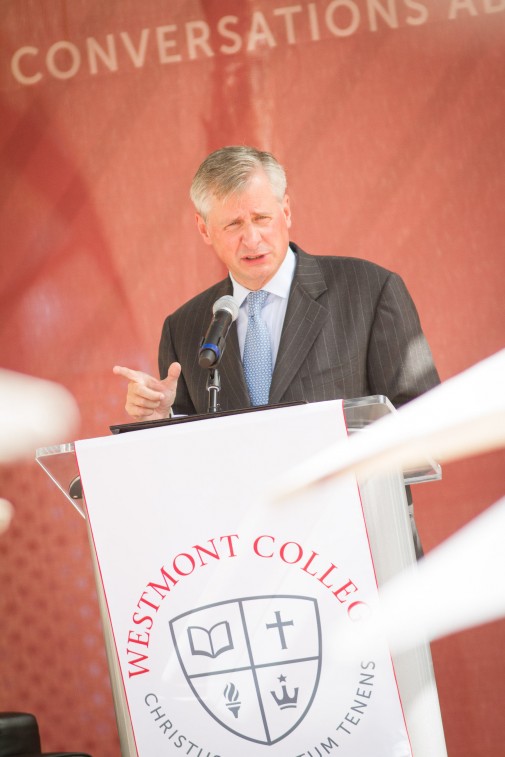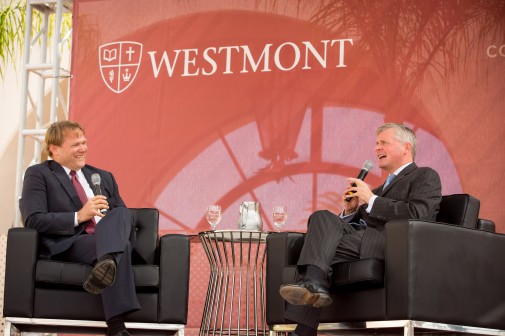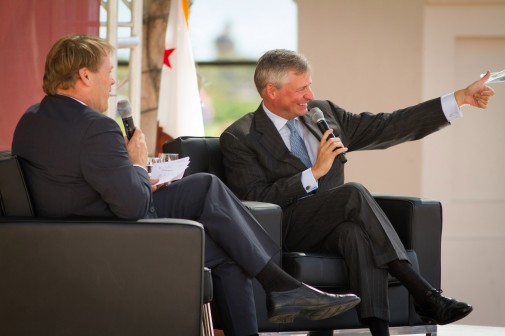Leadership Talk Explored Jefferson, Jackson
By
Westmont

Jon Meacham, presidential historian, examined the political lives of two of the United States’ greatest presidents at a sold-out, outdoor luncheon with 280 people on Oct. 10 at the Fess Parker – A Doubletree Resort by Hilton. The talk, “The Moral and Ethical Leadership of Jefferson and Jackson,” launched Westmont’s year-long series on Moral and Ethical Leadership in the American Presidency, which is sponsored by the Mosher Center for Moral and Ethical Leadership.
“I am thrilled that you have undertaken this immensely wonderful, important project,” Meacham said. “I find that again and again, no matter what the subject is, we return to the question of leadership. Moral leadership is in fact the central task of our presidents when it’s done correctly.”
Meacham explored the character of Thomas Jefferson and Andrew Jackson, as well as the tasks and challenges they faced.
“When you realize that these presidents are people too, that they are not Godlike, Zeus-like figures, but human beings who did great things, then you yourself as a flawed person, could also, perhaps do great things,” Meacham said. “One of the points of biography is not to look up worshipfully or look down condescendingly, but to look at people in the eye. And when you see them in the eye you see them and judge them for what they were and in that sense the biography become illuminating and inspirational.”

Jefferson, who wanted to be seen as a philosopher, knew that politics are a messy and contentious business. “On the best of days, if you get 55 percent of people on your side you are a wildly successful politician,” Meacham said. “That still means on your best day, 45 percent of the people are against you. Ronald Regan, whose ranch is not far from here, is the last president to win extraordinary popular vote, and he still had 44-45 percent of the country who disapproved of him to the very end.”
Jefferson, who was in political office for 37 of 40 years, was a working politician who loved the great contest of politics. “Our greatest presidents, the ones who we revere and celebrate down the years, are the ones who seemed to actually want to be there,” Meacham said. “Ronald Reagan wanted to be there. Bill Clinton wanted to be there. He still wants to be there. He may be back.”
Jackson believed that the United States was one great family that could stand on its own and withstand any global pressures if it stayed together. “Arguments would rage, there would be great fights, but the country had to stand as a united house,” Meacham said, paraphrasing Jackson.
In 1832, when South Carolina passed the Doctrine of Nullification, declaring that a state could pick and choose which laws it wanted to follow, Jackson reacted viciously and violently.
“Jackson did this because he saw his moral leadership, his moral obligation to preserve the inheritance that had been given to him,” Meacham said. “To honor the sacrifice of his own family and to stand in the line with Washington, Adams, Jefferson, Madison, Monroe and Adams and take his stand in the arena.
“He believed that we would argue, we would fight, we would disagree, but we had to do it under the same roof. To tear apart the country would invite European adventurism and encourage the Spanish, French and British to attempt, once again, to recolonize and seek influence.”
 In concluding, Meacham said that the nation was an experiment to both Jefferson and Jackson, but one that could not under any circumstances be allowed to fail. “Their moral insight,” Meacham said, “was that as, Jefferson put it, ‘The United States was the world’s best hope.’ They devoted their lives to creating, preserving and protecting a nation–state in which the ideals of the Revolution could take their stand in the long history of the world.
In concluding, Meacham said that the nation was an experiment to both Jefferson and Jackson, but one that could not under any circumstances be allowed to fail. “Their moral insight,” Meacham said, “was that as, Jefferson put it, ‘The United States was the world’s best hope.’ They devoted their lives to creating, preserving and protecting a nation–state in which the ideals of the Revolution could take their stand in the long history of the world.
“They were imperfect. They defended slavery. They were architects and executioners of Native American people. They thought rather too much of themselves. And from a philosophical point of view they were hopelessly hypocritical, but they were not primarily or in Jackson’s case even secondarily, philosophers. They were politicians. Public men dedicated to the public business with all its inherent limitations. And I would submit that we should thank God that they were.”
Meacham, one of America’s most prominent public intellectuals, is a Pulitzer Prize-winner and contributing editor at Time magazine.
The leadership series features Bob Woodward on Jan. 16, Doris Kearns Goodwin on March 6 and Ron White on May 26. Tickets for the luncheons cost $100 each. Tickets to the President’s Breakfast, which go on sale Friday, Feb. 6, are $125. For more information and tickets, see www.westmont.edu/leadershipseries.
Filed under
Academics, Campus Events, Featured, Giving, Lectures, Press Releases